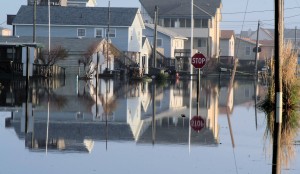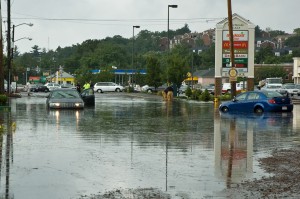 A flooding expert witness can determine if flooding was caused by nature or by the actions or in-actions of others. Excess water in about any situation can cause a lot of damage. Typically, excess water is called flooding.
A flooding expert witness can determine if flooding was caused by nature or by the actions or in-actions of others. Excess water in about any situation can cause a lot of damage. Typically, excess water is called flooding.
Some Causes of Flooding
According to flooding expert witnesses, flooding can have many causes but some of the most likely are:
- Flooding from a nearby water body (a stream or lake)
- The building elevation is too low
- The 1% Chance Storm event was exceeded
- Receiving excessive storm-water runoff from upstream
- Undersized or failed detention pond
- Addition of impervious surface without detention
- Removal of vegetation
- Re-grading existing ground to increase the runoff
- Changing the existing or normal drainage paths
- Failure of an upstream dam
- Drainage structure issues
- Undersized or failed storm pipes
- Undersized or failed drainage swales
- Undersized or failed storm-water inlets
- Clogged drainage structures
- Improper site grading around or near the building
- Sewage backup into the home or on the property
- Internal leaks or plumbing failure
We’ll discuss each of these further in future flooding expert witness articles, but for now, we will address each of these briefly.
Flooding From a Nearby Water Body
Flooding from a nearby water body (a stream or a lake) may be the most typical example of flooding. It is also one of the easiest to protect yourself from. First, you should always consider the surrounding drainage when you choose a site to build or purchase an existing home. FEMA flood maps show the Special Flood Hazard Areas on a given parcel of land. These are available for most property in the US. If you need help with this an Engineer familiar with flooding should be consulted. Sometimes these hazards may not be anticipated by the buyer. The seller or real estate agent may not have disclosed these facts. The flood maps may not have a study done in this area, therefore no flood hazard zone is shown on the maps. It should be pointed out that EVERY stream or drainage ditch has a level at which the water will rise to during a particular rain event. And, the flood maps reference the 1% chance (or 100 year) storm event, shown as the Base Flood Elevation (BFE). This storm can happen or be exceeded in any given year. We’ll discuss flooding caused from rainfall events that exceed the 1% chance storm event in another article. If the home or building isn’t built at or above the BFE then the building will likely flood during such an event.
Receiving Excessive Storm-water Runoff from Upstream
One of the main reasons for litigation from a flooding situation is that something upstream has changed which causes the stream or lake to rise higher than it normally would. Your upstream neighbor may do away with the vegetation that was soaking in part of the storm-water. They may add paving or a building that increases the runoff. They may change the runoff from its previous path. They may fail to build a detention pond to hold back the excess water or build an under-sized detention pond. Any of these situations can cause additional flooding downstream. The collapse or failure of an upstream dam can cause catastrophic damage downstream. The amount of damage will relate to the size of the dam and the amount of water it is holding back.
Drainage infrastructure issues
The design, installation, and maintenance of drainage structures are another cause of flooding leading to possible litigation. Drainage structures include storm pipes, inlets, swales, and pond outlet structures. An undersized or under-designed drainage system is a recipe for disaster. This may start with the City or governing body that regulates the development or construction. It may be the design engineer’s shortcoming. Or, it could be the contractor who didn’t follow the design. In some cases it is a combination of these. Most cities have a minimum storm event that should be used for design. This doesn’t mean that you HAVE to use that for design, just that it is the minimum. Many areas use a 10% chance storm (10 year event) as a minimum while others use a 4% chance storm (25 year event.) And detention ponds may have multiple storm events requirements. In all cases, some consideration should be given to what is downstream of the site. Is it a residential development, a school, or a nursing home? If so, maybe you should exceed the minimum, especially if the minimum is a 10% storm event.
Improper site grading
While there are building codes that prescribe proper grading around a home or structure, this is sometimes overlooked, or not inspected as closely. Again, the contractor, or builder should make sure that the storm water has a way to get away from the building quickly. Standing water near a building foundation, a basement wall, or in an area where fill was placed under a structure may lead to settlement, leaks, and failure of the structure.
Sewage backup
Sewage backing up into a home not only damages property but also presents health risks to those in the building. Sewage backup could be caused by a failed backflow prevention valves or inadequate backflow prevention. New construction upstream can cause sewage surges that force sewage into the home. Or excess groundwater can infiltrate into the sewage pipe. Backup onto the property isn’t as harmful as into the home but it is still not desirable and requires proper cleanup.
Internal Leaks
Internal leaks or plumbing failures are usually covered by insurance if they happen “suddenly.” Even if they are insurable, they’re still a mess. (As I write this, I’m on my 5th week of repairs after a toilet supply line, about a $5 part, failed in my home.) But, sometimes these may be caused by faulty equipment or installation.
Flooding Expert Witness
A flooding expert witness can be a pivotal member of the defense or plaintiff’s team of experts. Seek out an expert with practical design experience and experience in flooding cases as an expert. The flooding expert witness should also be able to communicate the concepts in an understandable and impartial manner. Call an Alabama Expert Witness Today at (334) 826-6677.
